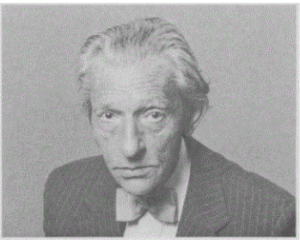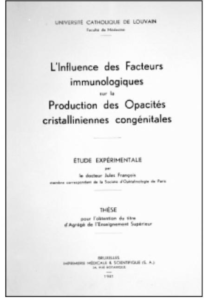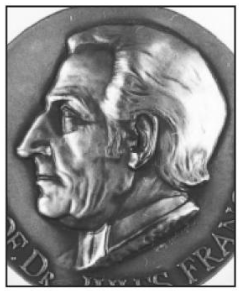Jules Francois – Goal of International Ophthalmology
Emile Jules Marie Joseph Francois

Jules Francois was born on 24th May 1907, Gingelon, in the region of Limburg, Belgium. He graduated in medicine in 1930. In the beginning, he was interested in microbiology, but his early study on the production of cataract by immunologic response had stimulated him towards Ophthalmology.

He entered private ophthalmology practice at Charleroi. Also, combined his clinical acumen with scientific research to publish enormously. This made him the Chair of Ophthalmology at the University of Ghent.
Francois Contributions:
Amongst Francois major contributions was detailing the anatomy of the central retinal artery and central optic nerve artery. Additionally, designed instruments for tonometry, perimetry, dark adaptation and electrooculography. He described several syndromes like Vascular pseudopapillitis, corneal dystrophies, facial dystosis, Fundus flavimaculatus and dystrophic skin-bone cornea.
His name is associated with 3 medical eponyms
- Francois Neeten’s dystrophy: Rare corneal dystrophy with stromal opacities resembling flecks
- Fraser Francois syndrome: Rare syndrome with crytophthalmos and developmental deformities in nose, ear, larynx and genitals
- Hallermann–Streiff Francois syndrome: Hallermann reported congenital cataracts and a bird head in a 25-year male in 1948. After two years, Streiff reported a similar condition in a 31-year woman. Later, Francois reviewed and published a definitive account of 150 cases from the literature. In this article, he used the term ‘Francois dyscephalic syndrome.’
Achievements:
He gained an international reputation for the range and quality of his work and became president of the International Council of Ophthalmology. It was because of his immense involvement with the worldwide ophthalmologic community that he was invited to join the SURVEY’s Editorial Board as head of a section named “Ophthalmology International.”
- His editorial talents were many and his innumerable publications (1870 papers and authored or edited 34 textbooks) on every subject in ophthalmology made him a renowned figure with numerous acquaintances all over the world.
- He was an editorial board member of more than 30 medical journals.
- He trained Ophthalmologists from 33 countries.
- Francois received honorary doctorates from 21 Universities. Also, was president/secretary/honorary member of 120 scientific committees.
- Francois received numerous awards and honours. Altogether, Professor François received medals from 40 different universities throughout the world.
- In Ghent, he organized more than 20 international ophthalmologic meetings. He appeared to be in excellent health and was as enthusiastic and hospitable as ever.
- Additionally, founded journal of Ophthalmic Paediatrics and Genetics in 1980.
Also read, Founder of Scientific Ophthalmology- Von Graefe
François has very generously donated his entire ophthalmologic library to the Jules François Foundation. Most of the ophthalmologic journals from all over the world are present. Besides the journals, it has an impressive number of ophthalmologic textbooks in many different languages.
He travelled frequently across the world, bringing together ophthalmologists from all of the continents. He achieved a deeply felt goal, namely, that international ophthalmology is one large, coherent family of which he was the godfather and president. His book Twenty-five Years of International ophthalmology (1957-1982) reflected his dedication to the international ophthalmologic world. He was a master of verbal synthesis and the written word. Nevertheless, could translate complicated problems into relatively simple terms in many languages. At international meetings, he was a favourite speaker in English, French, German, Dutch, and Italian, and he never forgot to bring a few jokes.
Despite his immense accomplishments, Francois was modest, kind and helpful in his relationships with his patients and colleagues. Francois observed astutely and communicated effectively. He required very little sleep and had indefatigable energy and drive. He was a universal ophthalmologist, a Renaissance figure in an era when ophthalmology was undergoing a tremendous increase in its basic knowledge and potential.
His legacy:
He died suddenly on 14 th August 1984, at the age of 77 years, while vacationing in his beloved Zermatt, Switzerland. Buried at the cemetery in Mariakerke near Ghent after a service in the Church of St Pieterbuiten in Ghent.
After his death, Jules Francois gold medal created in his honour and it still exists.

An International Symposium, “Lasers in Ophthalmology,” held in memory of Jules François on Sept 20 to 22, 1984, in Ghent.